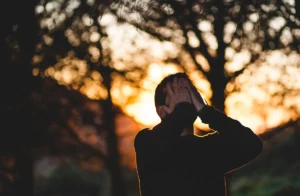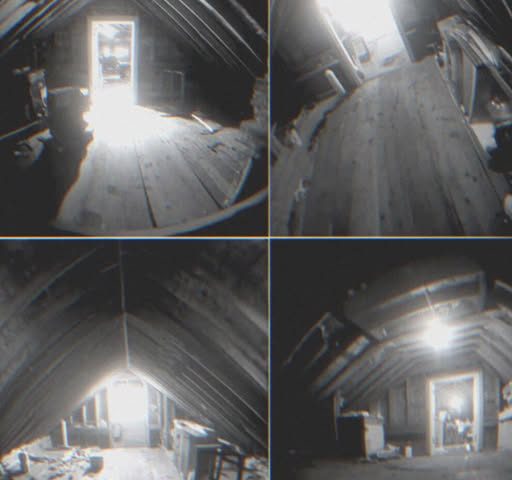When I moved into my late father’s house, I expected creaky floors and old pipes, but not the strange noises coming from the attic every night. Curiosity turned into fear, and when I finally installed hidden cameras, what I saw made me question everything I thought I knew about him.
Every ending is just a beginning. That’s what I kept telling myself as I stood in the empty hallway of my father’s house, surrounded by boxes. Endings hurt, but they always push you toward something new, whether you’re ready or not.
I hadn’t spoken to my father in almost ten years. Not because of some explosive fight or betrayal, but because he had a way of closing doors without slamming them.
One day, I simply realized we hadn’t talked in months, then years, and I didn’t even know when the distance between us had become permanent.

When he died, I felt… not grief, exactly. More like an ache for something that never really existed between us.
The house was mine now. That’s what the lawyer said as he handed me the keys and a small envelope with my father’s handwriting on it.
He’d written about the house: the broken step on the back porch, the flickering light in the hallway, the boiler that needed replacing. Ordinary, practical things. But near the end, the words stopped mid-sentence.
“And the most important thing you need to know is…”
That was it. No continuation. No clue.
My father had died without finishing his last sentence, and no one could tell me what it was meant to be.
By the time I’d finished unpacking, it was already dark. I dropped onto the old couch, too tired to care that it smelled like the attic.
Why had he left the house to me of all people?
He could’ve sold it, given it to charity, or left it to some friend I didn’t know existed. But instead, he left it to me, the daughter he barely knew.
He’d spent his life keeping everything and everyone at arm’s length, and yet here I was, surrounded by his things, trying to figure out who he really was.
Just as my eyes began to close, the doorbell rang. I groaned, forcing myself up.
A woman stood on the porch, gray-haired, wrapped in a knitted cardigan.
“Hi there,” she said. “I just wanted to see who moved in. You must be Richard’s daughter, right?”
I nodded. “Yes, I am.”
“Oh, he was such a wonderful man,” she said. “Always helping everyone around here. He even brought me groceries when I broke my leg last year.”
For a second, I thought she must be joking. “You’re sure we’re talking about the same person?” I asked.
“Of course,” she said with a laugh. “Kind, polite, always had time to chat. You’re lucky to have had a father like him.”
“That’s… nice to hear. It was lovely meeting you, Mrs—”
“Oh, please, call me Jean,” she said warmly before heading back down the steps.
I closed the door slowly, leaning against it for a moment.
My father, kind and helpful?
Maybe she was old enough to confuse faces, or maybe she just needed to believe in good neighbors.
I sighed and went upstairs to my room, collapsing onto the bed. As sleep began to pull me under, I heard it.
A faint rustle. Somewhere above me.
Another soft sound, like something moving in the ceiling.
I exhaled and muttered into the dark, “Please, don’t let it be rats.”
The next morning, I decided that if I was going to live here, I had to make the place mine, or at least try.
That meant starting with what my father had left behind. His office was down the hall, the only room I hadn’t touched yet.
The room was exactly as I remembered from childhood: a heavy, wooden desk, tall shelves, and a single chair with cracked leather arms.
On the desk sat a photo album, its brown cover faded and corners worn down. I hesitated before opening it.
The first photo was of me: gap-toothed, messy-haired, clutching a toy rabbit. Then came high school, then college, each smile frozen in time.
He’d kept them all, every moment he’d missed. It felt strange, like a stranger collecting pieces of my life but never reaching out to live any of them with me.
I closed the album, trying to shake off the strange ache it left behind. For the next few hours, I sorted through his things.
I made three piles: keep, donate, throw away. By the time I was done, I was exhausted, my hands covered in dust.
I decided to take a break and drive to the grocery store. The fridge was almost empty except for a jar of mustard that had probably survived two presidents.
When I got back, the afternoon light was fading. While unpacking groceries, I found an open box of cereal with a note that read, For Tommy.
Tommy?
I didn’t know anyone by that name. I grabbed my phone to call Mom, but before I could dial, a loud thud came from the attic, like something heavy had fallen.
I climbed the narrow stairs, scanning the dusty space. Nothing seemed out of place, but one wall caught my eye.
Faint seams ran through the wood, almost like a hidden door. I touched it, searching for a latch, but there was none.
Uneasy, I went back downstairs and finally called Mom.
“How’s the house?” she asked.
“Creepy,” I admitted. “I found a cereal box labeled For Tommy. And the neighbor said Dad was this sweet, helpful man. You believe that?”
Mom sighed softly. “Your father wasn’t a bad person, Emma. He just didn’t know how to show himself. Some people love in quiet, complicated ways.”
“Complicated’s one word for it,” I muttered. “I also found a photo album. With my pictures. Did you send them to him?”
“Yes,” she said. “He asked me for every one. He wanted to see how you were doing.”
“So he wanted to see me, but not actually see me.”
“He loved you,” Mom said gently. “He just didn’t know how to be a father. He grew up without one himself. It wasn’t easy for him.”
Before I could respond, a soft creak echoed above me. Then another. I stiffened. “Mom, I’ll call you back.”
I climbed the stairs again, heart pounding, and swept the beam of light across the attic floor.
This time, there were tiny crumbs scattered near a dusty rug, the same kind that comes from cereal.
I crouched down, running my fingers over them. They were fresh.
“Great,” I whispered. “Mice.”
I’d set traps all over the attic, but days passed, and not a single one caught anything. The sounds, however, didn’t stop.
Every night there was a creak, a faint thud, or that same soft shuffle I couldn’t quite place.
I’d gone up there countless times, sweeping my flashlight over every corner, hoping to find a reason, but it always looked the same.
One evening, I pulled into the driveway and saw Jean waiting by her fence.
“Emma, sweetheart, I’m so sorry to bother you,” she said. “My security cameras stopped working. Could you take a quick look? I know you’re younger, you probably understand these things better than me.”
“I’m not great with tech, but I can try.”
Inside her cozy living room, I sat down at her desk and clicked through the system. The cameras were fine, every feed was clear.
“They’re working,” I said.
Jean frowned. “Oh, dear. I must’ve imagined it then. I just thought I saw something strange on one of the videos, looked like a light in your attic. But there’s no light up there, is there?”
“No. There’s not.”
“Must’ve been a reflection or something. Anyway, thank you, dear.”
I forced a polite smile, but as I walked back home, her words kept circling in my head. A light in the attic. The attic that had no lamp.
Eventually, I decided to do what any restless, slightly paranoid person would do: I bought cameras.
A small set, just enough to cover the corners of the attic. I spent half the evening setting them up, connecting the feed to my laptop, checking every angle.
Hours passed. I sat in bed, watching the live feed until my eyelids grew heavy. The last thing I remember was telling myself I’d just rest for a second.
A loud crash jolted me awake. It came from above. I nearly jumped out of bed but stopped when I remembered the cameras.
My hands shook as I opened the laptop.
At first, all I saw was darkness. Then movement. A figure, and then, unmistakably, the shape of a woman.
She moved carefully across the attic floor. The camera’s infrared light caught her face just long enough for me to see she was young.
The wall behind her, the one with the seams, was open, a faint glow spilling from inside.
My breath caught. The screen blurred as I slammed the laptop shut and ran for the attic stairs.
When I pushed open the door, there was only silence. Then a dull noise, and by the time I reached the top, the hidden door was closed again.
“I know someone’s here!” I shouted. “Come out right now!”
No response.
“I have you on video,” I said louder. “If you don’t come out, I’m calling the police!”
For a few seconds, there was nothing. Then — click. The sound of a lock turning. The hidden door slowly opened, revealing a young woman clutching a small, sleepy boy.
The child rubbed his eyes. “Why did the lady wake me up?” he mumbled. The woman hushed him softly.
“Who are you? What are you doing here?”
“We live here.”
“What do you mean you live here?”
“Your father let us stay,” she said. “He found out we had nowhere to go. He told me to keep Tommy safe.”
The name hit me like a jolt. “Tommy?” I asked. She nodded.
“Then why are you hiding in the attic?”
“He told us to. He said that if anything happened to him, we should stay here until you came. He said you’d know what to do. That there would be a letter.”
My mind flashed to the unfinished note on my nightstand. The most important thing you need to know is…
“He didn’t finish it,” I said quietly. “He died before he could.”
“He wanted to tell you about us. He said he’d been a bad man, a bad father, but he wanted to do something right before it was too late.”
I stared at her, unsure what to feel. “This sounds… impossible.”
“I know,” she said. “But it’s true. He helped me when no one else would. He always talked about you, how much he wished he’d been different.”
For a long moment, none of us spoke.
I looked at the boy in her arms, his head resting on her shoulder.

“Come downstairs,” I finally said. “You can’t keep living up here. Stay in the house. I’ll help you for a while, until you find a job.”
She shook her head. “I can’t. It’s your home.”
“No,” I said quietly. “It’s more yours than mine.”
